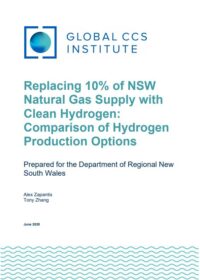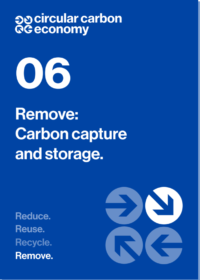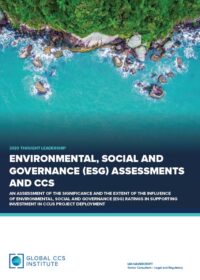Resources
Publications
Our publications, reports and research library hosts over 500 specialist reports and research papers on all topics associated with CCS.
View our Publication Library Disclaimer.
Filter by
Global Status of CCS 2023 – Report & Executive Summary
9th November 2023
Organisation(s): Global CCS Institute
Topic(s): Global Status Report
Reaching global climate goals will require a massive scale-up of CCS.
This report and executive summary outlines the state of CCS across the globe in 2023 and the benefits of scaling up CCS for the future.
The status report provides a global snapshot of CCS progress, highlighting the rapid development of CCS across North America, Asia Pacific, Europe and the UK, and the MENA region in 2023.
To download the full 2023 Global Status of CCS Report PDF please download it using the button below.
To download the two-page Executive Summary click here.
For more info, visit: https://status23.globalccsinstitute.com/
Disclaimer
The content within the Global CCS Institute Publications, Reports and Research Library is provided for information purposes only. We make every effort and take reasonable care to keep the content of this section up-to-date and error-free. However, we make no claim as to its accuracy, currency or reliability.
Content and material featured within this section of our website includes reports and research published by third parties. The content and material may include opinions and recommendations of third parties that do not reflect those held by the Global CCS Institute.
Replacing 10% of NSW Natural Gas Supply with Clean Hydrogen: Comparison of Hydrogen Production Options
17th November 2020
Organisation(s): Global CCS Institute
Topic(s): Australia, Carbon capture and storage (CCS), Hydrogen
Clean hydrogen is produced by either using renewable energy to produce green hydrogen, or by using fossil fuels with carbon capture and storage (CCS) to create blue hydrogen.
As part of determining the most cost-effective method of creating clean hydrogen, Coal Innovation NSW (CINSW) commissioned the Global CCS Institute to investigate the production costs of replacing 10 per cent of NSW’s natural gas supply with clean hydrogen.
The study considers a scenario where sufficient clean hydrogen is produced to achieve a 10% H2:90% CH4 (natural gas) mix by volume in the NSW gas network and supply the same total energy as is currently supplied by natural gas alone. Options considered were reformation of natural gas with carbon capture and storage (CCS), coal gasification with CCS, and electrolysis of water using renewable electricity. The study found that the best option for the production of clean hydrogen in NSW considering cost, scale, resource use, and emissions abatement outcomes is to utilise coal or gas with CCS.
See NSW Government for further information
Disclaimer
The content within the Global CCS Institute Publications, Reports and Research Library is provided for information purposes only. We make every effort and take reasonable care to keep the content of this section up-to-date and error-free. However, we make no claim as to its accuracy, currency or reliability.
Content and material featured within this section of our website includes reports and research published by third parties. The content and material may include opinions and recommendations of third parties that do not reflect those held by the Global CCS Institute.
Remove: Carbon Capture and Storage
2nd November 2020
Organisation(s): Global CCS Institute
Topic(s): Carbon capture and storage (CCS), CCS policy
Ahead of the 2020 G20 summit, the Global CCS Institute was asked to contribute to the Circular Carbon Economy (CCE) Guide, organised by KAPSARC. In a report titled 'Remove: Carbon Capture and Storage', Alex Zapantis assesses the value of CCS as an effective climate mitigating technology that aims to remove CO2 from the atmosphere and support the establishment of a circular carbon economy.
The report was discussed during a live webinar hosted by KAPSARC.
To read the report in full, click download below.
Disclaimer
The content within the Global CCS Institute Publications, Reports and Research Library is provided for information purposes only. We make every effort and take reasonable care to keep the content of this section up-to-date and error-free. However, we make no claim as to its accuracy, currency or reliability.
Content and material featured within this section of our website includes reports and research published by third parties. The content and material may include opinions and recommendations of third parties that do not reflect those held by the Global CCS Institute.
Environmental, Social and Governance (ESG) Assessments and CCS
16th October 2020
Organisation(s): Global CCS Institute
At the request of the US Department of Energy, The Global CCS Institute undertook an examination of the significance and the extent of the influence of Environmental, Social and Governance (ESG) ratings in supporting investment in CCS project deployment.
The objective of this study was to consider the following five questions:
- How does a company’s ESG rating impact the company?
- How does a company’s CO2 footprint or exposure impact its ESG rating?
- How is CCS considered when the ESG performance of a company with a large CO2 footprint or exposure is rated?
- Do the positive impacts of CCS (if any) on a company’s ESG rating support the business case for investing in or financing CCS?
- How does climate litigation and public policy impact corporate risk and ESG ratings?
The resulting assessment addressed each of these questions, to provide a clearer picture of the complex relationship between the development and scope of ESG ratings, the impacts of a company’s ESG performance and ultimately, whether this will influence future investment in CCS.
Disclaimer
The content within the Global CCS Institute Publications, Reports and Research Library is provided for information purposes only. We make every effort and take reasonable care to keep the content of this section up-to-date and error-free. However, we make no claim as to its accuracy, currency or reliability.
Content and material featured within this section of our website includes reports and research published by third parties. The content and material may include opinions and recommendations of third parties that do not reflect those held by the Global CCS Institute.
De-risking of CCS: A Primer for Investors and Businesses in the United States
28th September 2020
Organisation(s): Global CCS Institute
Topic(s): CCS finance, Risk, United States
Over the past year, the outlook for CCS has been positive, particularly in the United States (US). Thanks to broad bipartisan support at both the federal and state level, CCS in the US has seen growth exceeding that of any other nation.
Additionally, the Institute has seen an increase in new stakeholders looking to engage and explore the role of CCS in their emissions reduction strategies. These new stakeholders include sustainable investors who believe CCS projects can deliver strong returns while achieving environmental goals and mitigating climate change risk.
These new market entrants, however, often share a common concern; the need to de-risk CCS for investment.
This briefing will serve to summarise ongoing work by the Institute to communicate and educate stakeholders on the potential risk characteristics of CCS and to discuss these in the context of de-risking CCS investments and addressing challenges from a US perspective.
Disclaimer
The content within the Global CCS Institute Publications, Reports and Research Library is provided for information purposes only. We make every effort and take reasonable care to keep the content of this section up-to-date and error-free. However, we make no claim as to its accuracy, currency or reliability.
Content and material featured within this section of our website includes reports and research published by third parties. The content and material may include opinions and recommendations of third parties that do not reflect those held by the Global CCS Institute.
Global Storage Resource Assessment 2020
2nd July 2020
Organisation(s): Global CCS Institute, Pale Blue Dot
Topic(s): CO2 storage
The CO2 Storage Resource Catalogue is a pioneering initiative to accelerate the deployment of carbon capture, utilization and storage (CCS) by supporting the consistent evaluation of storage resources.
This report, authored by Pale Blue Dot Energy, details the findings of the first assessment for CO2 Storage Resource Catalogue.
Disclaimer
The content within the Global CCS Institute Publications, Reports and Research Library is provided for information purposes only. We make every effort and take reasonable care to keep the content of this section up-to-date and error-free. However, we make no claim as to its accuracy, currency or reliability.
Content and material featured within this section of our website includes reports and research published by third parties. The content and material may include opinions and recommendations of third parties that do not reflect those held by the Global CCS Institute.
Overview of Organisations and Policies Supporting the Deployment of Large-Scale CCS Facilities
30th June 2020
Organisation(s): Global CCS Institute
Topic(s): CCS policy
While there are currently relatively few CCS facilities in operation and in development, there are significant differences in the enabling environments for CCS deployment. This report explores the potential role of Delivery Bodies to help enable the deployment of CCS. It also provides an overview of the organisations involved in the deployment of large-scale CCS facilities, and the policy and regulatory frameworks that have supported this deployment.
Disclaimer
The content within the Global CCS Institute Publications, Reports and Research Library is provided for information purposes only. We make every effort and take reasonable care to keep the content of this section up-to-date and error-free. However, we make no claim as to its accuracy, currency or reliability.
Content and material featured within this section of our website includes reports and research published by third parties. The content and material may include opinions and recommendations of third parties that do not reflect those held by the Global CCS Institute.
Is CCS expensive?
30th May 2020
Organisation(s): Global CCS Institute
Topic(s): Carbon capture and storage (CCS), Cost
Carbon capture and storage (CCS) is needed as part of the toolkit of technologies to achieve net-zero emissions by mid-century. Yet, texts and commentary about CCS often include qualifiers that are related to the expenditures necessary to deploy it; ‘costly’, ‘exorbitantly expensive’, ‘unaffordable’, ‘uneconomical’. As such, the argument most often brought forward against deployment of CCS is that it is an expensive way of reducing emissions.
This brief written by our Senior Advisors for Advocacy and Communications Lucy Temple-Smith and Lee Beck demonstrates that:
- To reach net-zero emissions by mid-century and achieve global climate change targets all decarbonisation options are needed.
- Carbon capture and storage (CCS) plays an important role reducing emissions to net-zero and limiting the overall system cost of decarbonisation.
- With versatile applications, CCS cost differs across its variety of industrial and power-related applications – there is no singular cost of CCS.
- Considering the urgency of the climate crisis, cost should not be a deterrent to investing in CCS nor dictate sequencing of the deployment of decarbonisation options. Instead, deployment will lead to cost reductions.
- A value on carbon is needed to support the business case for large-scale CCS deployment and overcome the technology ‘valley of death’.
Disclaimer
The content within the Global CCS Institute Publications, Reports and Research Library is provided for information purposes only. We make every effort and take reasonable care to keep the content of this section up-to-date and error-free. However, we make no claim as to its accuracy, currency or reliability.
Content and material featured within this section of our website includes reports and research published by third parties. The content and material may include opinions and recommendations of third parties that do not reflect those held by the Global CCS Institute.
CCS Development in Southeast Asia
25th May 2020
Organisation(s): Global CCS Institute
Topic(s): Carbon capture and storage (CCS), Carbon capture use and storage (CCUS), Southeast Asia
In recent decades, Southeast Asia has been one of fastest growing regions of the world. Its energy demand has grown more than 80 per cent from 2000. Oil, coal and gas provides more than 70 per cent of its energy. With the region's power generation fuel mix and rapidly growing natural gas production, alongside established and emerging emissions reduction committments, CCS has a unique and critical role to play.
In this paper, Institute’s Senior Client Engagement Lead Dr Tony Zhang, discusses why Southeast Asia needs CCS, the specific drivers behind the opportunities for accelerated deployment and the critical role of CCS hub and cluster networks in reducing the region's emissions.
Disclaimer
The content within the Global CCS Institute Publications, Reports and Research Library is provided for information purposes only. We make every effort and take reasonable care to keep the content of this section up-to-date and error-free. However, we make no claim as to its accuracy, currency or reliability.
Content and material featured within this section of our website includes reports and research published by third parties. The content and material may include opinions and recommendations of third parties that do not reflect those held by the Global CCS Institute.
The Value of Carbon Capture and Storage (CCS)
13th May 2020
Organisation(s): Global CCS Institute
Topic(s): Carbon capture and storage (CCS), Economic growth, Employment, Industrial CCS, Jobs
The new flagship Global CCS Institute thought leadership report analyzes the major benefits of the large-scale investment and deployment of CCS and discusses the existing evidence related to the value of CCS under two overarching themes.
CCS as an essential technology to economically meet long-term climate targets and for risk mitigation through:
- Achieving deep decarbonisation in hard-to-abate industry;
- Enabling the production of clean hydrogen at scale;
- Providing low-carbon dispatchable power;
- Delivering negative emissions.
CCS is a driver of economic growth and employment by:
- Creating and sustaining jobs;
- Supporting economic growth through new net-zero industries and innovation spillovers;
- Facilitating a just transition by alleviating geographic and timing mismatches;
- Enabling infrastructure reuse and deferral of decommissioning costs.
This report was authored by the Institute's Senior Consultant - Economics Alex Townsend and Research Analyst Nabeela Raji, as well as the Institute's General Manager - Commercial, Alex Zapantis. You can tweet about the report using #ValueCCS.
Disclaimer
The content within the Global CCS Institute Publications, Reports and Research Library is provided for information purposes only. We make every effort and take reasonable care to keep the content of this section up-to-date and error-free. However, we make no claim as to its accuracy, currency or reliability.
Content and material featured within this section of our website includes reports and research published by third parties. The content and material may include opinions and recommendations of third parties that do not reflect those held by the Global CCS Institute.
CCS: Applications and Opportunities for the Oil and Gas Industry
7th May 2020
Organisation(s): Global CCS Institute
Topic(s): Carbon capture and storage (CCS), Energy, Oil and gas, Transition
As oil and gas companies are evolving their business models in the context of the energy transition, and a growing number of them are committing to net-zero targets, CCS has started to feature more prominently in their strategies and investments.
In this paper, Institute’s General Manager Guloren Turan discusses how CCS can support the oil and gas industry’s low-carbon transition and addresses current developments and opportunities in applications including gas processing, enhanced oil recovery, ethanol production, refining, low-carbon hydrogen production, gas-fired power generation, and direct air capture.
Disclaimer
The content within the Global CCS Institute Publications, Reports and Research Library is provided for information purposes only. We make every effort and take reasonable care to keep the content of this section up-to-date and error-free. However, we make no claim as to its accuracy, currency or reliability.
Content and material featured within this section of our website includes reports and research published by third parties. The content and material may include opinions and recommendations of third parties that do not reflect those held by the Global CCS Institute.
The Role of CCS in the Paris Agreement and its Article 6
29th April 2020
Organisation(s): Global CCS Institute
Topic(s): Carbon capture and storage (CCS), Carbon markets, Carbon removal, Policy law and regulation
There has been a growing interest within the Institute’s membership – and elsewhere – in the opportunities to drive the deployment of CCS by the provisions of Article 6 of the Paris Agreement. This paper draws together all the latest information and thinking on the Article and its role in enabling countries to meet the objectives they have set themselves in their Nationally Determined Contributions (NDCs), with particular emphasis on how it can impact CCS.
The paper, authored by our Senior Policy Advisor Eve Tamme and Consultant John Scowcroft, provides insights into the history of Article 6, elaborates on how it can be an enabler for CCS, and looks into the upcoming developments in this field by answering the following questions:
• What does Article 6 do?
• What does Article 6 not do?
• Where is Article 6 in the international climate negotiations?
• What does Article 6 mean for CCS?
• What are the next steps?
Disclaimer
The content within the Global CCS Institute Publications, Reports and Research Library is provided for information purposes only. We make every effort and take reasonable care to keep the content of this section up-to-date and error-free. However, we make no claim as to its accuracy, currency or reliability.
Content and material featured within this section of our website includes reports and research published by third parties. The content and material may include opinions and recommendations of third parties that do not reflect those held by the Global CCS Institute.











